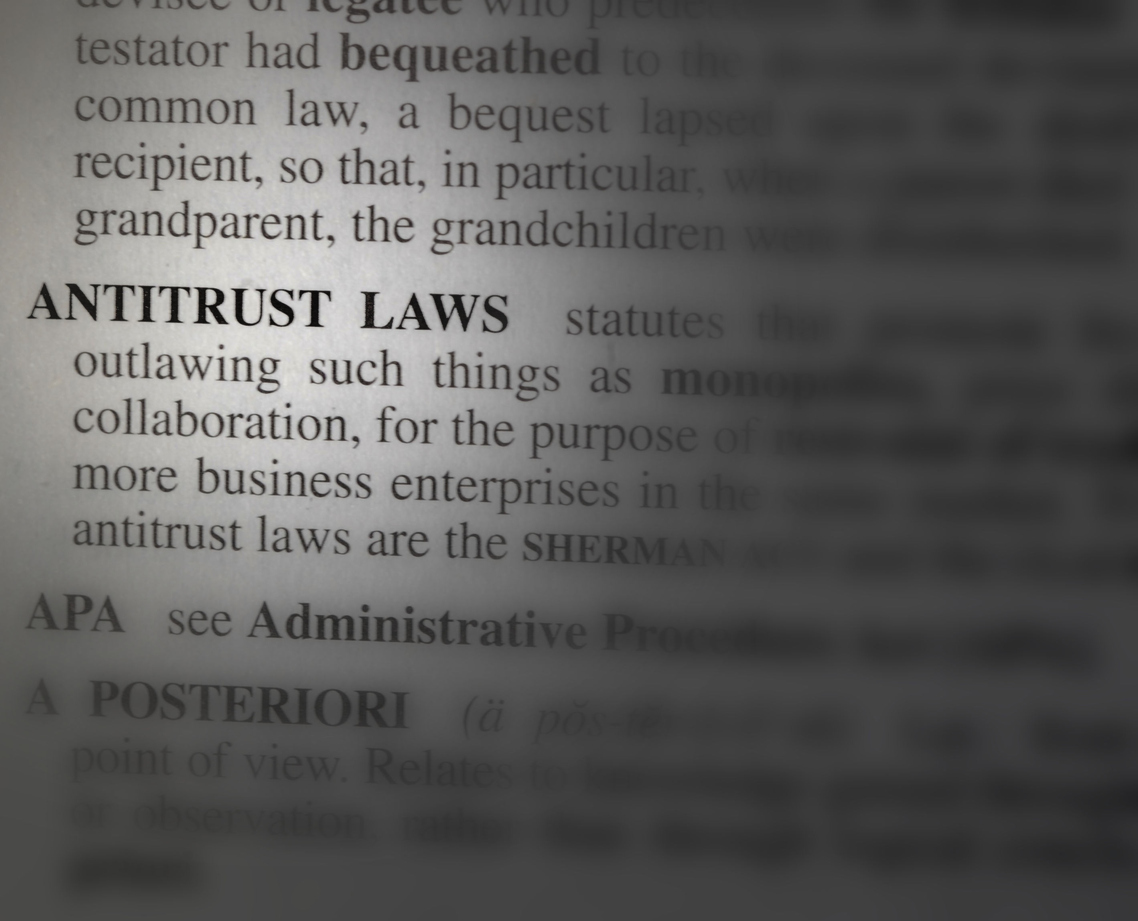If you are a claims adjuster, you probably hear about “antitrust laws” once in a blue moon. I suspect that the only time the topic may come up is at an industry seminar or trade conference. Someone usually reads a quick warning at the beginning of the event telling everyone to avoid certain topics, and then the discussion and event moves on. It might seem like a minor detail or a technical rule that does not really apply to everyday claims work.
I would suggest that once your career moves along so you are a claims manager or claims executive making decisions about how a claims organization operates, antitrust law becomes more important than most people realize. It is worth understanding the basics if you are a professional overseeing the claims function. History has taught that ignorance of these laws can have serious consequences.
Antitrust laws are rules that promote fair competition in the marketplace. They are designed to stop businesses from working together in ways that reduce competition, fix prices, limit services or create unfair advantages. In the insurance world, many people think antitrust laws apply only to companies working together to set premiums or rates. While that is a concern, the truth is that most antitrust risks come up in many other areas, including how claims are handled.
In the 1990s, a major consolidated class action lawsuit, often referred to as Hartford Fire Insurance Co. v. California, 1 made this very clear. In that case, nineteen states and many private parties sued insurance companies, reinsurers, and insurance trade groups. They accused them of working together to change the standard commercial insurance policies in a way that made coverage harder to get and more expensive for businesses. The lawsuit claimed that the insurers and their support organizations tried to force policy changes that excluded pollution coverage, limited how defense costs were handled, and made other changes that hurt policyholders. The companies used their control over reinsurance and industry policy forms to pressure other insurers to fall in line.
This lawsuit showed that antitrust laws are not just about setting prices. They can also be about working together to control the products and services that are available in the market. After years of fighting in court, the Supreme Court ruled that most of the lawsuit could go forward.
Eventually, the case led to a major settlement in 1995. 2 As part of the settlement, the Insurance Services Office (ISO), which allegedly had helped coordinate these efforts, had to change how it operated. It reorganized its business, added independent board members, and agreed to new limits on what it could do when setting forms and offering advisory services.
The Hartford case also helped shrink the insurance industry’s long-standing protection from antitrust lawsuits. This protection, known as the McCarran-Ferguson Act, had given insurers some limited exemption from federal antitrust laws as long as states were regulating the insurance business. But that protection is not as strong as many people think. It does not cover things like boycotts, coercion, or agreements to limit competition. In fact, the McCarran-Ferguson Act specifically says that boycotts are never protected. 3
What does all this mean for claims adjusters today? In my view, it means very little to most people who are not in a position to make such agreements. The vast majority of attendees at many insurance trade conferences are not agreeing to do anything other than to learn and have fun.
As careers develop and front-line adjusters and other claims professionals move into more influential positions, it is important to understand that antitrust risks can arise in claims handling processes and not just in setting premiums. If claims managers or insurance executives share confidential information about how they handle claims, agree on methods or ways to adjust, pay or deny claims, or work together to avoid using certain contractors, vendors, or service providers, they could be crossing into issues involving antitrust issues. Even informal conversations about how different companies handle certain claims can raise concerns if they lead to companies acting in similar ways that hurt competition or policyholders.
Many industry organizations publish antitrust warnings before their events to remind participants not to discuss sensitive topics. These warnings are not just for show. They are there because lessons learned from past antitrust cases have taught that even well-meaning professionals can get into trouble if they are not careful about what they share and how they collaborate.
It is also important to remember that not every type of cooperation is illegal. Insurers can work together to improve general education, training, and efficiency. They can talk about common challenges, new technologies, or trends in the industry. But when discussions turn into agreements about how to handle claims, whom to work with, or how to avoid paying certain types of losses, the risk of violating antitrust laws becomes real.
As a claims manager or executive, you do not need to be an expert in antitrust law. But you should be aware of these few key ideas. If you ever feel that a discussion is moving into sensitive territory, it is best to speak up or excuse yourself. Antitrust violations can lead to heavy fines and lawsuits for companies and individuals.
The bottom line is that antitrust law is about keeping the insurance marketplace fair and competitive. It is not there to make life harder for claims professionals. It is there to protect customers, to make sure that insurers are making their own decisions independently, and to prevent quiet agreements that limit coverage or harm policyholders. Understanding the basics can help you do your job better and protect both yourself and your company from serious legal risks.
If you ever have questions about what is safe to discuss or not, it is always smart to check with your company’s legal department or compliance team. They can give you guidance and help you stay on the right side of the law. Antitrust might seem like a complicated subject at first, but at its heart, it is about fairness, honesty, and making sure that everyone competes in a way that serves the public.
For my public adjuster friends, you must be wondering about my thoughts on surplus lines insurers placing anti-public adjuster clauses into policies. While I am not an expert in this area of the law, I would suggest that those individuals at insurance companies and reinsurance companies who are writing or requiring these clauses seek legal opinions from experienced antitrust lawyers. It seems obvious that antitrust issues could be raised because it appears to be a boycott that harms the customer.
For my contractor and insurance restoration industry friends, there are already antitrust cases successfully prosecuted about body shops and those arrangements, which seem to be similar to the same issues being raised with managed repair concepts. Those cases should be studied, and actions brought if property insurance companies are breaking antitrust laws and harming your industry and customers.
For those interested in this topic, I would suggest reading Insurance Antitrust and The McCarren-Ferguson Act: Boycotts, The McCarran-Ferguson – Expanded, and The McCarran-Ferguson Act – What is it and How Does it Impact Insurance?
Thought For The Day
“Education costs money. But then so does ignorance.”
—Claus Moser
1 Hartford Fire Ins. Co. v. California, 509 U.S. 764 (1993).
2 In re Insurance Antitrust Litigation, MDL No. 767 [Settlement Agreement] (N.D. Cal.).
3 Robert T. Horst, Craig A. Cohen, and Mark H. Rosenberg, The “Business of Insurance” – Erosion of the antitrust exemption for insurers, 45 No. 5 DRI For Def. 21 (May 2003).




